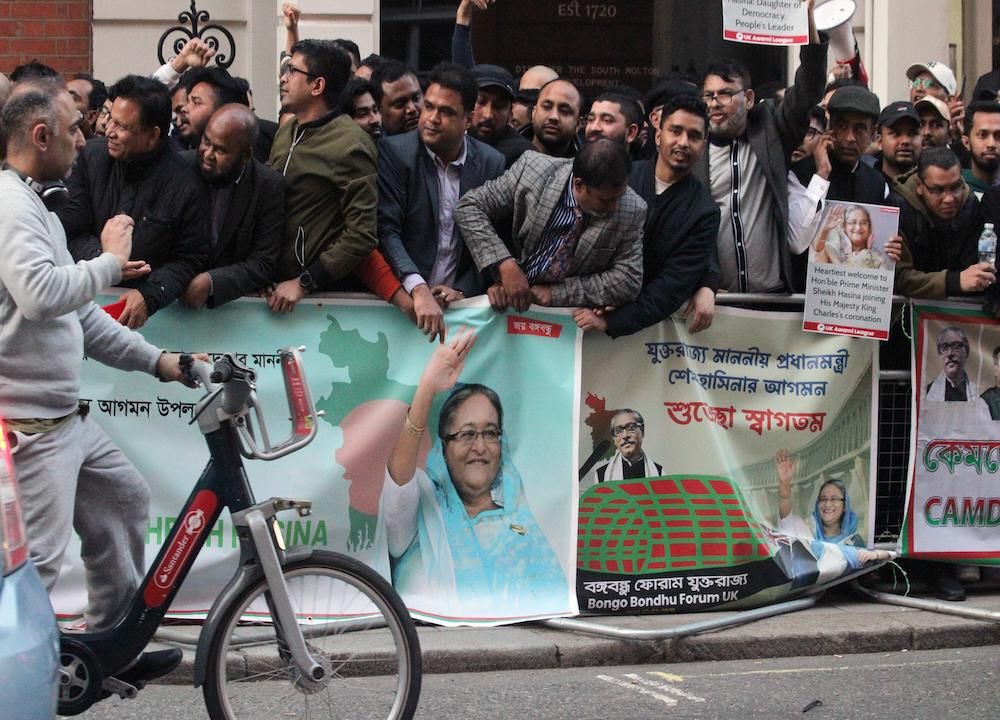UK-Bangladesh “bilateral meeting” claims untrue
False claims of formal meeting with UK prime minister likely to further tarnish the reputation of Sheikh Hasina's authoritarian government.

In what might be seen as a rather desperate ploy to garner wider perceptions of greater international legitimacy for Prime Minister Sheikh Hasina and her increasingly authoritarian government, Bangladesh’s High Commission in the UK has misrepresented a recent informal conversation between her and the UK prime minister as a “bilateral meeting”.
Bangladeshi media, quoting the Bangladesh High Commission, referred to a conversation between Sheikh Hasina and Rishi Sunak at Marlborough House on May 5th, the day before the coronation of King Charles III, as a “maiden bilateral meeting” between the two leaders. The government press agency BSS distributed a report titled “PM Hasina holds maiden bilateral talks with Sunak” which was widely reproduced in the Bangladeshi media.
Saida Muna Tasneem, the High Commissioner, also told reporters that, “Sunak had meetings with only seven [of the heads of state and government visiting from 130 countries] including Bangladesh’s prime minister, which manifests that Bangladesh has wonderful relations with the UK in terms of political, diplomatic and economic [matters]".
However, a UK government official confirmed to Netra News that “the only formal bilateral meetings that took place with the UK prime minister resulted in press statements on the prime minister's website.”
The Downing Street website provides press statements reporting bilateral meetings on May 4th and 5th between the UK prime minister and the prime ministers of Canada, New Zealand, Australia, and Spain; the presidents of Brazil and Rwanda; and the Emir of Qatar. There is no press release relating to any meeting held with Sheikh Hasina. 10 Downing Street in fact tweeted: “The Prime Minister has held talks with leaders from Rwanda, Australia, New Zealand, Qatar and Brazil, who are in London for the #Coronation.” Again no mention of Bangladesh.
The government official went on to say that any “other conversations with world leaders” — like that held with Sheikh Hasina — “were informal conversations during the receptions at Buckingham palace and Marlborough House.”
There is a video on the Awami League twitter feed of such an informal conversation between the two prime ministers in which it appears that the Sunak was asking her about her niece and the labour MP, Tulip Siddiq. Sunak says: “… She asked me… I don’t think she has asked for one recently, actually. I will check next time I see her… Are you seeing her while you are here?... Are you here for a few days?” One cannot hear Hasina’s responses to these questions.
Sunak's family "fans of Sheikh Hasina"?
What then should one make of the the Bangladesh High Commissioner claims that the UK prime minister had said that “his two daughters and wife are admirers of Hasina, and he wished his daughters to be great leaders like her.”
Indeed, the Awami League have been circulating on social media this quote supposedly said by Rishi Sunak which reads: “I have two little daughters. They and my wife are all fans of Prime minister Sheikh Hasina. I want my two daughters to become leaders like Sheikh Hasina.”
With the High Commissioner not telling the truth about the very nature of the meeting between the two prime ministers — turning an “informal conversation” into a “bilateral meeting” — should one give credibility to anything she said about the conversation itself? This is a particularly pertinent question as the High Commission has just recently been caught red-handed in fibbing (or at least misrepresenting) the facts about the Bangladesh government’s role in certain 50th anniversary events in the UK.
There certainly was a time in the past when international leaders might well have had good reasons to say such laudatory things about Sheikh Hasina — perhaps during the Ershad period, or even in the 1990s. But it would be very surprising if any democratic leader could be quite so praiseworthy about Hasina in her current incarnation as the Bangladeshi prime minister, who despite social economic and social gains, has turned the country in a striking authoritarian direction, with rigged elections, a miserable human rights record and serious press censorship.
However, there is no accounting for taste — or indeed lack of knowledge about Bangladesh’s contemporary politics — and with 10 Downing Street not responding to queries about what the UK prime minister did or did not say to Hasina in their “informal” conversation, one can’t discount the possibility that Sunak did say this.
If that was the case, then while this may well play as good propaganda in Bangladesh, it probably does not play so well within Downing Street who would not be at all happy that Muna Tasneem has briefed out private informal conversations to the press in this manner.
So, either the High Commissioner has inaccurately quoted the UK prime minister or she has divulged to the media private conversations with a world leader, which, any diplomat with rudimentary knowledge should know is highly unprofessional. Whichever of these, Bangladesh’s reputation in London is likely to have taken a bit of a nose-dive.
Netra News sought a response from the Bangladesh High Commission but at the time of publication, has not heard back.